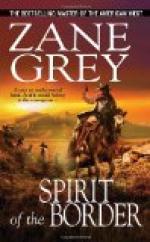Wetzel soon realized that his own cunning was matched. He trusted no more to his intuitive knowledge, but stuck close to the trail, as a hungry wolf holds to the scent of his quarry.
The Delaware trail led over logs, stones and hard-baked ground, up stony ravines and over cliffs. The wily chief used all of his old skill; he walked backward over moss and sand where his footprints showed plainly; he leaped wide fissures in stony ravines, and then jumped back again; he let himself down over ledges by branches; he crossed creeks and gorges by swinging himself into trees and climbing from one to another; he waded brooks where he found hard bottom, and avoided swampy, soft ground.
With dogged persistence and tenacity of purpose Wetzel stuck to this gradually fading trail. Every additional rod he was forced to go more slowly, and take more time in order to find any sign of his enemy’s passage through the forests. One thing struck him forcibly. Wingenund was gradually circling to the southwest, a course that took him farther and farther from the Delaware encampment.
Slowly it dawned upon Wetzel that the chief could hardly have any reason for taking this circling course save that of pride and savage joy in misleading, in fooling the foe of the Delawares, in deliberately showing Deathwind that there was one Indian who could laugh at and loose him in the forests. To Wetzel this was bitter as gall. To be led a wild goose chase! His fierce heart boiled with fury. His dark, keen eyes sought the grass and moss with terrible earnestness. Yet in spite of the anger that increased to the white heat of passion, he became aware of some strange sensation creeping upon him. He remembered that the Delawares had offered his life. Slowly, like a shadow, Wetzel passed up and down the ridges, through the brown and yellow aisles of the forest, over the babbling brooks, out upon the golden-flecked fields—always close on the trail.
At last in an open part of the forest, where a fire had once swept away the brush and smaller timber, Wetzel came upon the spot where the Delaware’s trail ended.
There in the soft, black ground was a moccasin-print. The forest was not dense; there was plenty of light; no logs, stones or trees were near, and yet over all that glade no further evidence of the Indian’s trail was visible.




